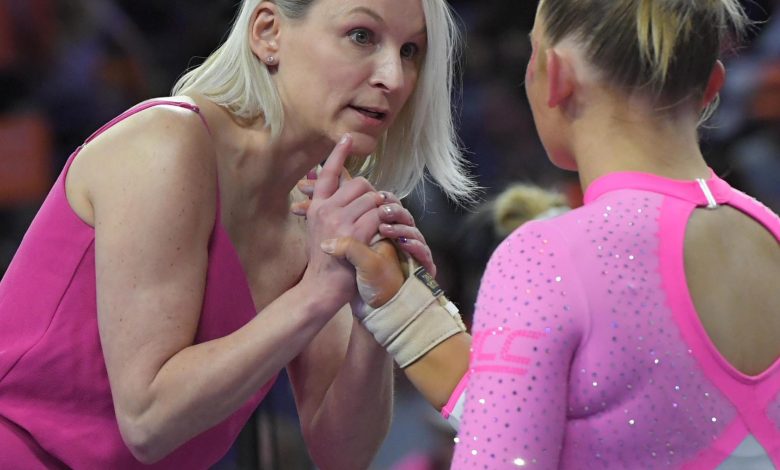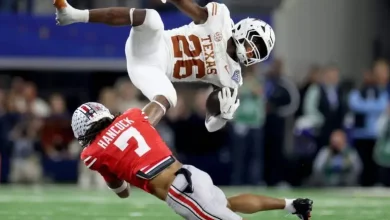Clemson fired gymnastics coach Amy Smith for cause, citing contract violations and parent emails alleging verbal and mental abuse.

In a development that has sent shockwaves through the collegiate gymnastics community, Clemson University announced the termination of gymnastics coach Amy Smith for cause. The university’s decision was formally communicated in a termination letter that referenced specific contract violations, notably sections relating to the “responsible treatment” of athletes. This action came amid increasing concerns and complaints from parents and athletes, who alleged verbal and mental abuse under Smith’s tenure.
The firing raises important questions about athlete welfare, university oversight, and the culture within competitive collegiate gymnastics. This article delves deep into the events leading to Smith’s dismissal, the allegations made against her, and the broader implications for Clemson and NCAA athletics.
Amy Smith’s Tenure at Clemson
Amy Smith, a former collegiate gymnast herself, was hired by Clemson University in 2019 to lead its gymnastics program. Known for her technical expertise and a competitive mindset, Smith was expected to elevate the Tigers to new heights in a conference traditionally dominated by powerhouses such as Florida and Georgia.
During her first seasons, Smith’s coaching style was characterized by discipline, intensity, and a focus on physical conditioning. Under her guidance, Clemson made notable progress, improving its meet scores and recruiting some promising young talent. However, whispers about the team’s internal culture began to circulate as early as the 2023 season.
Former assistant coaches and gymnasts noted that Smith’s approach, while rigorous, sometimes bordered on harsh, creating a stressful environment for student-athletes. Despite these concerns, few complaints were formally lodged until recently.
The Termination: Grounds and Process
The decision to terminate Amy Smith for cause was finalized in late June 2025, following an internal investigation initiated after several parents contacted Clemson’s athletic director, Graham Neff, with serious allegations.
The termination letter sent to Smith explicitly cited breaches of the contract, particularly clauses relating to the “responsible treatment” of student-athletes. While the university has not publicly released the full text of the letter, sources familiar with the matter indicate that these breaches encompass failure to provide a safe and supportive environment, improper communication methods, and neglect of athlete well-being.
Termination for cause is a significant action, implying that Smith’s dismissal was not simply a result of poor team performance but rather due to serious professional misconduct.
Parents’ Concerns: Emails and Allegations
The catalyst for Clemson’s investigation appears to be a series of emails sent by concerned parents to Athletic Director Graham Neff. These communications detailed incidents described as “verbal and mental abuse” experienced by their daughters while on the gymnastics team.
In these emails, parents alleged that Smith used harsh language, intimidation, and emotionally manipulative tactics. Reports included descriptions of Smith yelling at athletes during practice, belittling gymnasts over mistakes, and fostering a culture of fear rather than encouragement.
One parent wrote, “Our daughter dreaded going to practice. She came home crying multiple times, feeling worthless and scared of making even minor errors.” Another parent expressed concern about the psychological impact, stating, “The emotional toll on these young women is unacceptable for any coach, let alone one representing Clemson University.”
These allegations have resonated with many in the gymnastics community, where athlete mental health has increasingly become a topic of national discussion.
Clemson University’s Response
Clemson University responded swiftly to the complaints by launching an internal review. Athletic Director Graham Neff emphasized the university’s commitment to athlete welfare in a statement released shortly after Smith’s termination:
“The health, safety, and well-being of our student-athletes are our top priorities. We take all allegations seriously and have acted decisively in accordance with our policies. Clemson remains dedicated to fostering a positive and respectful environment within all our athletic programs.”
Neff also acknowledged the difficulty in balancing a competitive atmosphere with the necessity of maintaining a supportive environment:
“Coaches are expected to push athletes to excel while upholding the highest standards of respect and care. Any deviation from these expectations will be addressed.”
The university has reportedly offered support services for current gymnastics team members, including counseling and mental health resources.
The Broader Context: Athlete Abuse in Collegiate Sports
Amy Smith’s firing is not an isolated incident in collegiate sports. Over the past decade, there has been growing awareness of abuse—both physical and psychological—in NCAA athletics.
Several high-profile cases, including USA Gymnastics and Michigan State University, exposed widespread abuse and misconduct by coaches. These scandals have prompted universities and governing bodies to reevaluate their policies and implement stricter safeguards for athlete welfare.
Mental health concerns have also taken center stage. A 2023 NCAA report highlighted that nearly 30% of student-athletes experience significant stress, anxiety, or depression during their college careers, with many attributing these issues to coaching methods and team culture.
In this context, Clemson’s action against Smith reflects a larger shift in priorities toward prioritizing athlete well-being and accountability.
Reactions From the Gymnastics Community
The gymnastics community has responded to Smith’s dismissal with a mix of relief and calls for ongoing vigilance. Current and former gymnasts have praised Clemson for taking decisive action but caution that institutional change is an ongoing process.
Former Clemson gymnast Rachel Martinez commented, “It’s encouraging to see the university hold a coach accountable. We need to continue pushing for environments where athletes feel safe and supported.”
Conversely, some supporters of Smith argue that intense coaching styles are part of the competitive gymnastics culture and question whether the allegations warrant termination.
Sports psychologists note that while discipline is essential, the line between motivation and abuse must never be crossed.
What’s Next for Clemson Gymnastics?
With Smith’s departure, Clemson faces the challenge of rebuilding trust within its gymnastics program. The university has launched a nationwide search for a new head coach who can balance competitive excellence with athlete-centered coaching.
Interim coaching staff have already begun working with the team, emphasizing communication, respect, and mental health.
Athletic Director Neff has promised transparency and community engagement throughout the hiring process:
“We want to ensure the next leader of Clemson gymnastics embodies our values and fosters a culture where all athletes thrive.”
Lessons Learned and Moving Forward
Amy Smith’s firing serves as a reminder of the critical importance of athlete welfare in collegiate sports. As universities strive to compete at high levels, they must never lose sight of the human beings behind the helmets, leotards, and uniforms.
Key lessons include:
-
Clear expectations and enforcement of respectful coaching practices.
-
Open channels of communication for athletes and parents to report concerns safely.
-
Mental health resources embedded within athletic programs.
-
Ongoing training and evaluation for coaching staff regarding athlete treatment.
The dismissal of Amy Smith marks a pivotal moment for Clemson gymnastics and collegiate athletics as a whole. It highlights the necessity of prioritizing athlete well-being, transparency, and accountability in coaching.
As the Tigers seek a fresh start, their story will be closely watched as an example of how programs can learn from past mistakes and strive to build healthier, more supportive environments for student-athletes.









